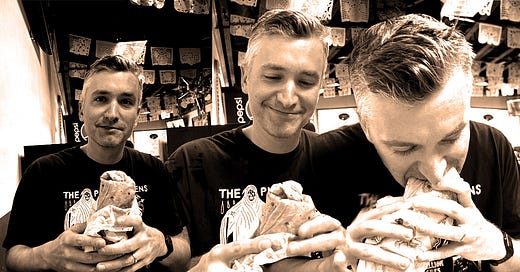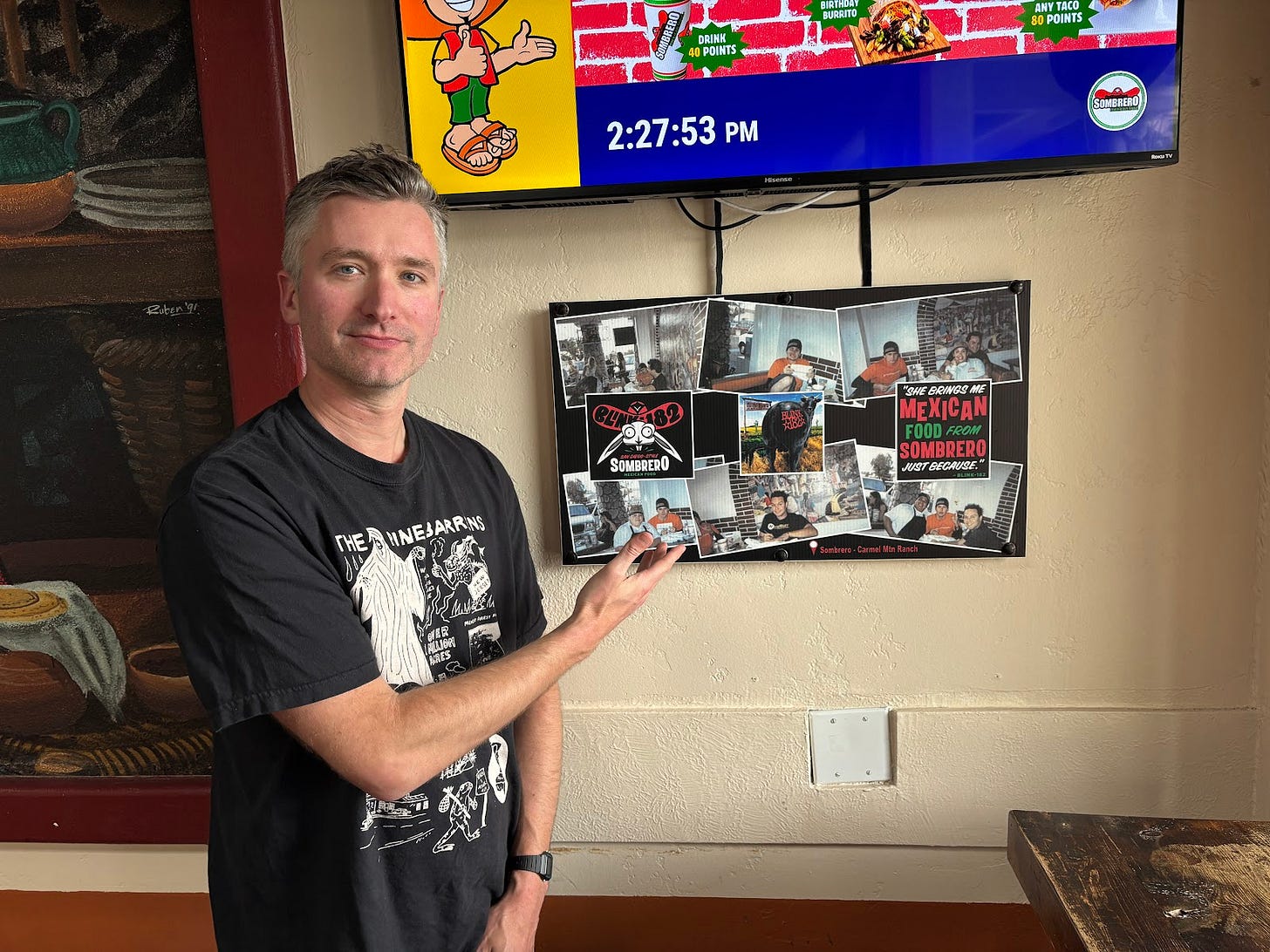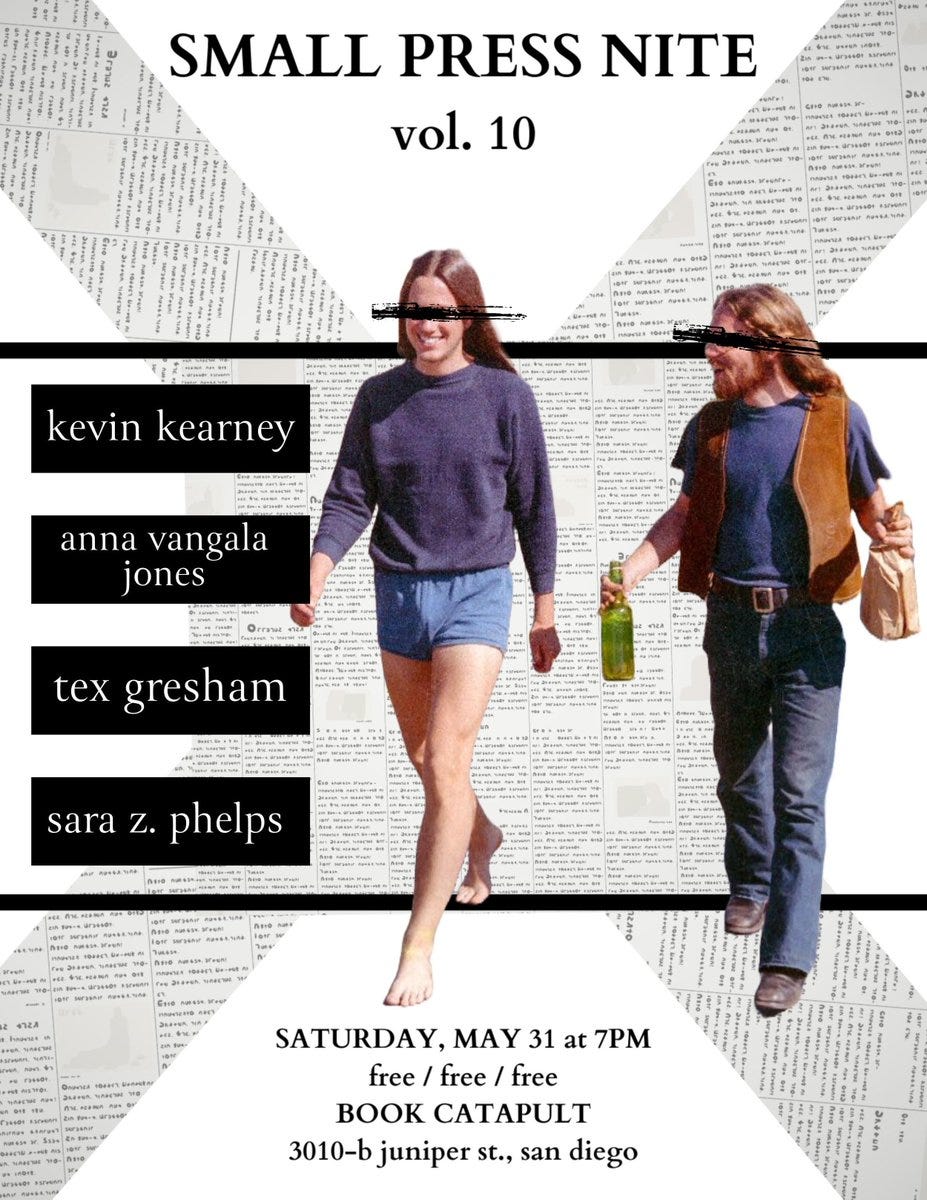Kevin Kearney’s ridescare
The author and Small Press Nite founder introduces us to a sinister new Uber in his thrilling novel, Freelance
“Should we do a gimmick, like, trying to find a good hoagie or cheesesteak?” texts author Kevin Kearney as we’re nailing down the location for this interview. Both options seem good. I lean toward hoagies, because, well, hoagie is objectively the funniest name for a sandwich. Cheesesteaks, on the other hand, would be thematically better, seeing that Kearney is from Philadelphia.
But after some contemplation, I nix both options. The place has to be quintessentially San Diegan. In fact, considering that Kevin and his partner are leaving town a day after the release of his second novel, Freelance, we need to find somewhere that’s the most San Diegan. It needs to be a place by which he’ll remember us.
“We could go to Sombrero,” he texts back. “I’ve known about it since I was in sixth grade and still have not gone.”
Bingo. We have our place.
Kearney doesn’t even have to explain himself, because I know he’s referring to “Josie”, the blink-182 song off 1997’s Dude Ranch in which Mark Hoppus immortalized the Mexican food chain: “She laughs at my dumb jokes when no one does/She brings me Mexican food from Sombrero just because”.
There are many locations in San Diego, but we make sure to meet at the blink-182 Sombrero nestled in a mundane shopping center in Poway, where the band’s affiliation is immediately evident by the shrine on the wall—a collage that appears to be the band members sitting in the restaurant after the release of Dude Ranch.
“We made it,” Kearney says, his voice soft with reverence, as if we’ve just arrived at our holy land. And maybe we have.
We order our burritos and sit down. We might as well have the entire restaurant to ourselves. It’s quiet, intimate. Just two blink bros unwrapping their burritos to the whirr of an AC unit.
I begin by telling him how stoked I am that he suggested this place, because so many people insist on doing interviews over the phone or zoom or email. It’s just easier to handle these things virtually. But, I tell him, I miss the writing style of Rolling Stone or Vanity Fair articles that set the scene—what the subject is wearing, how they look, what they’re eating (btw, Kearny’s burrito: pollo; mine: mixed).
Maybe even five years ago, that type of writing felt self-serving and indulgent. But now that writing is content, and most content is churn, and AI is creeping into every realm of the internet, I’m nostalgic for articles that don’t feel created, mediated or facilitated by technology.
And this uneasy relationship between humans and technology that plays a huge role in Freelance. The story follows Simon—a 19 year old borderline incel with few prospects, who lives with a bunch of left-leaning slacktivists, and whose only social lifeline is an OnlyFans girl to which he pays six dollars a month. Out of desperation, Simon signs up to be a Dryver with the mysterious rideshare app, HYPR. His loyalty to the app proves fruitful, and Simon begins to experience social and financial success that he’s never known before. Without giving too much away (because the book is, quite literally, a ride), Simon’s loyalty turns to obsession, and his relationship with the app becomes parasitic. It’s sort of like a vampiric horror story, where the app is Dracula and Simon is Renfield.
“It's funny you use the word horror,” Kearney says. “Because that was another thing that D.T. [Robbins, Kearney’s publisher at Rejection Letters Press] talked about—this opportunity to lean into one of the novel’s strengths, which is that it's kind of framed like a horror story.”
“But horror is not a genre that I've ever been a huge fan of,” Kearney says, which makes sense if you’re only familiar with Kearney’s first book, How To Keep Time—a simultaneously serious and surreal novel about father/brother/familial relationships. In contrast, Freelance is gleefully tense and insidious.
“I don't read horror, I don't really watch horror movies, but I think that if you're writing about tech, you need to lean into science fiction and horror. I think those two genres have to be at play if you are honestly writing about tech.”
Freelance benefits for that reason. When non-horror fans dabble in the genre, the results are more compelling and subversive that artists beholden to genre tropes or expectations. Some of our greatest horror films, for example, were directed by non-horror directors: The Shining, The Exorcist, Silence of the Lambs.
Because of this, Freelance skirts the usual story beats and style that bog down most tech-themed horror. Shows like Black Mirror or any recent novel about tech can be boiled down to “whoa, tech be crazy!” or presents it with an ironic detachment that expects readers to tacitly agree that, whoa, tech indeed be crazy. Ultimately, it’s just preaching to the choir.
What’s refreshing about Freelance is that it’s a sympathetic look at the allure of AI technology, treating its power as something more internal than external—that the fear of tech isn’t really about the technology, but tech’s ability to amplify the anxieties that already exist within us.
“I had the idea for [Freelance] when I was still living in Philly,” Kearney says. “Then the second we got to Oceanside, it was pretty much all I focused on. I had just left teaching—I’d been in the classroom for 10 years. It was my vocation, this is what I said I was gonna do since I was 15 years old. This is what I'm called to do, and then suddenly I wasn't doing it.”
Untethered from his profession, isolated, lacking community, and financially panicked, Kearney spent his days processing the existential crisis through his writing.
“I was without a job, and I just had the idea of a rideshare driver and technology kind of taking over. But I very quickly realized that a lot of what I was projecting onto Simon's job was really just about teaching. Like, feeling under the microscope, feeling like you're always going to be doing the wrong thing. I started to realize that, yeah, [Freelance] is not even specifically about teaching or rideshare driving. This is just like, what it means to be a worker right now.”
[Tom Delonge voice]: Work sucks, I know.
A few months after his move to San Diego, two of Kearney’s out-of-town writer friends wanted to read their work here, and asked if he could put together an event. This not only felt like an opportunity for Kearny to build community in a new city, but also create something that we needed: a regular reading series that didn’t feel pretentious.
“When I was in high school, I was firmly enmeshed in the punk scene,” Kearney says. “I was booking shows, I ran a label, playing in bands. I think I'm pretty good at this type of stuff.”
On May 13, 2023, Kearney put on his first Small Press Nite—a semi-regular, exquisitely curated literary event held at Book Catapult in South Park. In any other city, Small Press Nite may not seem novel: four or five authors read, the audience drinks free booze (that Kearney supplies), and then everyone hangs out.
But this is San Diego, a city where getting people out to an arts and culture event—especially a literary one—can feel like pulling teeth. Not to say it doesn’t happen (Verbatim, Burn All Books, and Libélula all do the lord’s work in this department), but Small Press Nite has been the first recurring series that I’ve found myself anticipating since covid killed the others (RIP The Foundry and Last Exit). For the first time in years, it feels like we have an event that mirrors the DIY vibe of AWP’s offsite readings (which, as I’ve written about, rule).
“[A literary reading] should feel more like a show or a house party rather than an academic conference,” Kearney says, explaining the ethos of Small Press Nite. “Something that I think a lot of writers struggle with is the notion of what a literary reading is. Like, they think it should be something from an MFA course or seeing a famous writer at a university. And I just have no interest in that at all. I don't want to go to a lecture on a Saturday night. I want to go to something that feels fun and feels like an arts community rather than a sanctioned university event.”
“[The first Small Press Nite was] really successful, and I was encouraged by that,” he continues. “I felt suddenly like, Oh, this is the type of community that I'm always aiming for. This is why I make art in the first place: to be able to share it with a group.”
And there couldn’t be a better place to celebrate the release of Freelance, which will go down on Saturday, May 31 at the Book Catapult. It marks the 10th iteration of Small Press Nite, but it’ll be Kearney’s final one before he leaves for Alaska. Finally, Kearney will be able to participate as a reader in this beautiful thing he’s created, and he’s ceremoniously passing the torch to San Diego writer KKUURRTT (still don’t really know whether to yell his name or growl it) who will hopefully continue to grow and develop Small Press Nite’s for a city that needs it (no pressure, KKUURRTT).
We finish our burritos. “That was...” Kearney pauses, probably considering all the pollo he just ingested, searching for words to express the profundity of sitting here in this historic Sombrero, a part of San Diego and punk rock history. “Okay.”
He’s right. The burritos are meh. Maybe they used to be better. Oh well. Things change. I guess this is growing up.








My heroes.